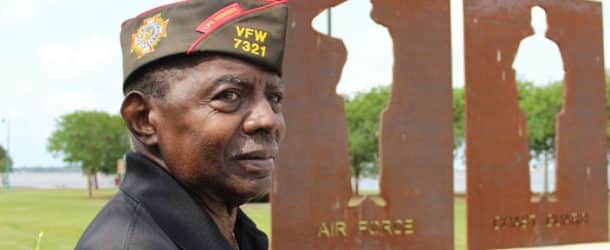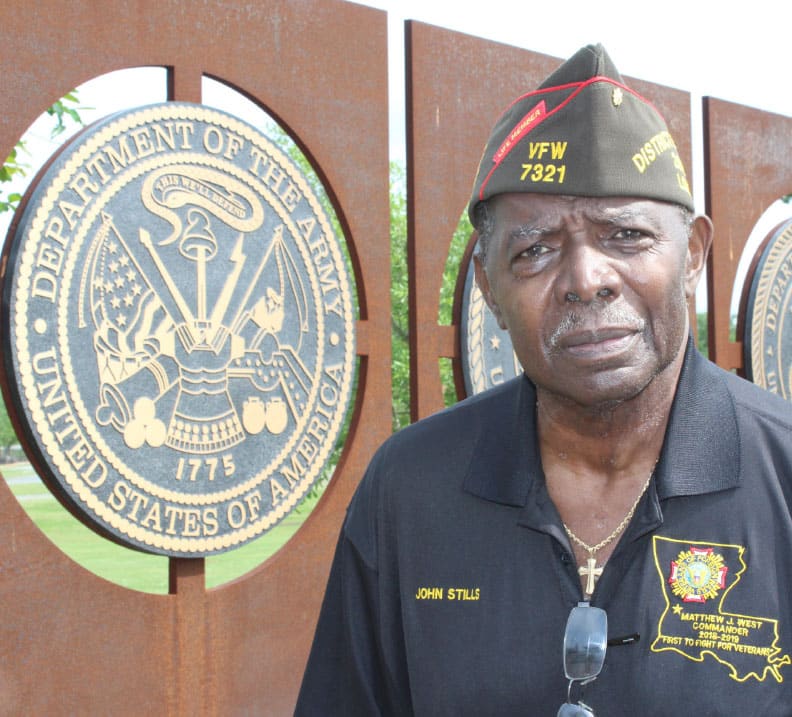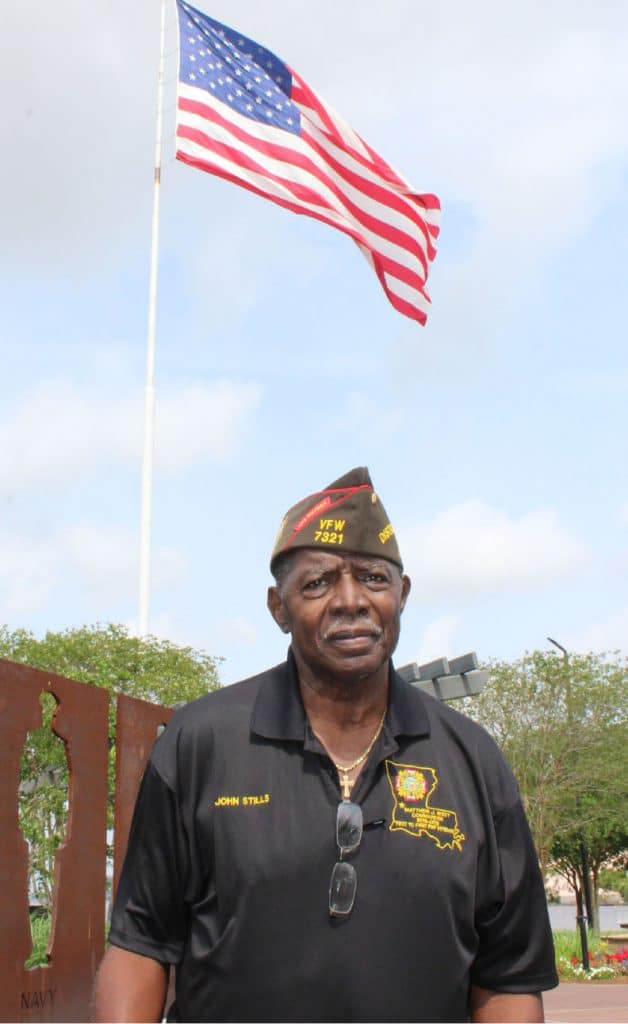Major John Stills, U.S. Army, Retired
Story And Photos By Scott E. Raymond
Today, Major John Stills, United States Army, (Retired), age 76, has retired twice: once, from the U.S. Army and, secondly, from a career in education. But he will quickly tell you that in spite of being retired, he is busier than ever.
Early Influences
Born and raised in Shreveport, Stills was the eldest son of a large family. He was educated in the public school system, finishing at Booker T. Washington High School, and notably, as the president of the school’s student council. His teachers took notice.
“We can’t let this talent go to waste,” Stills’ chemistry and mathematics teacher said.
Stills had several after-school mentors from the high school who put him in touch with two professors at Southern University in Baton Rouge. They got him placed at the university.
“The biggest part of my background comes from how proud I was to get into Southern University,” says Stills, “and the university turned into a family.
“The things my high school mentors did, taking their own time and everything else, it was a tremendous influence.”
Early on, it was apparent to Stills that getting a college education was the path to a better life, and he received several scholarships from fraternities on campus to help him through. He also worked his way through college. “I worked my way through college in the cafeteria and things of this nature,” says Stills.
While Stills was in college, President Kennedy was assassinated, and Stills took it hard.
“When John F. Kennedy, our President, died, I didn’t know that he was dead until about two days after because I had passed out on campus and found out I had zero sugar in my blood,” says Stills. “Then I heard the news about Kennedy and that didn’t help matters.”
Stills majored in mathematics at Southern with a minor in science. He also began taking Reserve Officer Training Corps (ROTC) training, which, he says, was mandatory at that time. It would turn out to be a transforming event in Stills’ early life.
“Southern University was one of the land-grant colleges and you could not attend a land-grant college without taking two years of ROTC — it was mandatory,” he says.
Stills soon discovered that ROTC could be his career path to becoming an officer in the U.S. Army, so he embraced it and graduated from Southern University in 1965 along with a commission as a second lieutenant in the United States Army.
Tours In Vietnam
Stills’ orders to active duty came as the Vietnam War was fully engaged with troops on the ground.
“I went to Airborne School; I was Airborne and Special Forces,” says Stills. “I commanded a B-Team for the 5th Special Forces Group (Airborne) at Ft. Bragg, N.C. Plus, I was in the 82nd Airborne at Ft. Bragg. Then, during the Vietnam War period, they collected all the officers and put them in one battalion and sent them over to Vietnam by ship.”
Stills says he was transported to Vietnam on the U.S. Naval Ship General Nelson M. Walker for 22 days, and he soon found out about sea sickness.
“I spent my first two weeks in bed eating soup and crackers because the storm came in and I wasn’t used to being on a ship at sea! This was in transit to Vietnam; my first tour.”
After his first Vietnam tour, Stills says he came back to the states and was assigned to teach at the Field Artillery School at Ft. Sill, Okla.
“Then, I put in a request to resign my commission,” says Stills. “They said, ‘Sorry about that,’ and they sent me back to Vietnam again for a second tour.”
Stills talks about his second tour in Vietnam:
“During my second tour, I found out that the troops that you were working with — you had to deal with a lot of different things.
“I was the battery commander on the second tour,” says Stills. “They took me out of headquarters of the group and they sent me to a firebase to relieve the commander up there. They sent me to Firebase Six, near Ben Het, South Vietnam — that was right after the siege of Ben Het. It’s very well-known because you could see the conflict that had occurred. And then from there, I had two guns down at Ben Het and four guns on top of Firebase Six.
“One time, a mortar came in while we were firing support for an infantry unit. The Viet Cong hit my generator, and that knocked out the computer that we were using. I took out the Artillery Tablet Firing Table and I was able to execute support from the book and continue to fire high-angle fire for the aircrafts dropping napalm underneath.”
Stills did two tours in Vietnam, 16 years on active duty and eight more years in the Reserves for a total of 24 years of military service, retiring as a U.S. Army Major.
A Second Career In Teaching
Following his military career, Stills began a second career in education as a math teacher. He says he soon learned how helpful a military background could be in controlling a class he had been assigned to early on in his teaching career.
“I went into education in Virginia, teaching mathematics in a secondary school. An administrator called me on the telephone. They were trying to find a geometry teacher that could control their class. Every time they had a teacher, they had problems with them — they were quitting. Sometimes the teacher wouldn’t even do a full day of teaching before quitting.
“Once I got there, I was a stronger disciplinarian. I found out that what the kids needed was someone to show them that they cared and to understand where they were in their studies.
“I walked into the principal’s office and I told him if I had 15 objectives to accomplish, but might not accomplish but five, those kids would know their basics. That’s what they were lacking.”
Stills says that through his student tutoring in conjunction with the L.E.A.P. Test, he realized that there were issues with solving problems and comprehensive reading due to students not knowing the basics.
After Virginia, Stills came to Lake Charles to teach, where he did so for five years, finishing out his 16-year teaching career. It was during this time that he met his wife Ester, who also worked within the educational system.
Giving Back To The Community: Helping Keep Patriotism Alive
Maj. Stills’ long-term desire to give back to the community stems from the help he received early in his education from high school teachers who served as mentors.
“The things that they did to help me later motivated me to want to give back to the community,” says Stills.
Over the years, Stills has accomplished this in different ways in different communities. In Calcasieu Parish, one way he has been giving back to the community for many years has been by helping to lead a program that informs primary and secondary education school students about Americanism and patriotism.
Stills chairs the Schools Program Committee on Americanism and Patriotism at the City of Lake Charles Mayor’s Armed Forces Commission, the Sulphur Armed Forces Committee, and the Vinton Mayor’s Armed Forces Commission.
He says the Schools Program Committee works in conjunction with the local Veterans of Foreign Wars (VFW) and The American Legion, which have programs offering scholarship awards or other recognition for students participating and/or competing in the organizations’ patriotism or Americanism programs as presented at the primary school, junior high/middle school and high school levels.
“We call it Americanism at the first through the fifth grades,” says Stills, “and the students color the flag or draw a picture of it and write essays on the topic.
“The Veterans of Foreign Wars does the Patriots Pen program in junior high/middle school. The students do an essay; a topic is changed each year, selected by the VFW. It’s a national program.
“The American Legion also has a program for junior high/middle schools,” says Stills, “the focus of which is on the Constitution of the United States.”
“The VFW and The American Legion work with the middle schools program and the Boy Scouts program. The American Legion and VFW do U.S. Flag instruction — which covers everything about the Flag, including the respect for the Flag — and provide the Scouts a place to meet.”
Stills works with the VFW and The American Legion on their Scout of the Year programs, which are available to various Scout organizations.
Stills says that additionally at the middle school level there is the opportunity for classes to get a speaker in conjunction with a nationally recognized patriotic day, such as Memorial Day or Veterans Day.
“We have a list of all the patriotic days,” says Stills, “and if a teacher finds out that they are covering a subject where they can get a service member in there to talk, they will do it. And we have special instructions for people who are going into the classroom; your ‘do’s’ and your ‘don’ts.’ Before they go into the classroom — you don’t just send anybody — you have to find who is going to go and you train them and you let them know what the requirements are.
“This program includes the VFW, The American Legion, the Boy Scouts, plus, you have the VFW and The American Legion Ladies Auxiliary — they go with the speaker for support,” he says.
“The students learn about patriotism,” says Stills.
Stills says there are also great scholarship/incentives programs offered by The American Legion (The American Legion High School Oratorical Scholarship Program — “A Constitutional Speech Contest”) and VFW (The Voice of Democracy Audio/Essay Contest) at the high school level. Participation is a challenge.
“We have problems getting kids to participate at the high school level,” says Stills. “By and large they just don’t want to do it,” he says.
“A high school participant in one of the programs, a young lady, went on to the state competition and she came out third. I was so proud of her,” says Stills.
“To compete,” he says, “they do an essay, plus record it. It has to be three to five minutes. If you go less, you are penalized, if you go over you are penalized. They go from local (Post) to district to state (Department) and then they go to national if they keep winning,” he says. “They receive monies all the way at the different competition levels — financial scholarships.”
Stills says there are also opportunities for teachers to receive awards for their class.
“Teachers at these levels can compete also,” says Stills. “We have a teacher’s award, and they get monies for their classroom if they go all the way to National. They get monies at local, at district, and at state from Veterans of Foreign Wars, and there is a program similar to it with The American Legion.
“And then we have MOAA — Military Officers Association of America,” he says. “They also provide scholarship awards for the different JROTC (Junior Reserve Officer Training Corps) units at the schools. Locally, we have one at Washington-Marion High School and one at LaGrange High School.”
Stills says the Schools Program Committee on Americanism and Patriotism is available to all primary, junior high/middle and secondary schools.
“The program is offered to all public schools, home schools, private schools and charter schools,” he says.
Stills works the program, indirectly, “with six parishes,” he says. “You send out information to all those parishes, and the other parishes besides Calcasieu are responsible for their units to get in to the schools.”
This writer asks Maj. Stills what the response has been, overall, for the Schools Program.
“It’s received positively,” he says, “but the thing is, if you don’t get out and get in the schools — put boots on the ground — then they don’t know about it.”
Stills tells a success story about a school where he was teaching. “It was a school closed on one of the patriotic days. I had an Honor Guard team that lived in the neighborhood and they came out and raised the flag, lowered the flag and brought it back to school when they returned. It was good,” he says.
“You have some other schools that are doing the same thing. We’ve used the Marine Corps League, Boy Scouts, and we use other organizations.”
Stills says he has been doing the Schools Program for Americanism and Patriotism for “many years” and that he still gets a lot of satisfaction from doing the program.
“When I go to the awards banquet and see the other people from the other Districts and see that our kids stack up against them, I love it!
“There is one teacher whose class I enjoyed sitting in because he taught the American Constitution in his class. He did an outstanding job. And there was a lady at the elementary level and the way she taught Americanism in her classroom — outstanding.
“We need more students participating in the Schools Program and talking their way to college.
“I thank the cities of Lake Charles, Sulphur and Vinton and their respective Mayor’s Armed Forces Commission (Committee) for their leadership and support,” he says.
Maj. Stills closes the interview by praising the local VFW and The American Legion Honor Guards.
“I want to say that I appreciate their meeting and bringing back our Missing in Action (MIA) bodies that we get. We’ve just had four of them that were sent back home.”
For more information about the Schools Program Committee on Americanism and Patriotism, contact Maj. John Stills, USA, (Ret.) at john.stills42@gmail.com.

















Comments are closed.